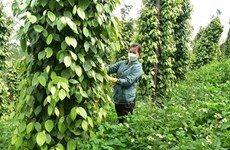APEC warned on business risks
Asia-Pacific economies should promote greater economic integration by
taking resolute actions to guard against financial and sovereign risks
while pursuing trade and investment, and maintain a robust growth
trajectory toward achieving certain goals.
Asia-Pacific economies should promote greater economic integration by
taking resolute actions to guard against financial and sovereign risks
while pursuing trade and investment, and maintain a robust growth
trajectory toward achieving certain goals, according to regional
business learders at the third session of APEC Business Advisory Council
(ABAC).
In their 1994 Bogor Declaration, leaders of the Asia-Pacific Economic Cooperation (APEC) agreed to the common goals of free and open trade and investment by 2010 for industrialised economies and 2020 for developing economies.
They agreed to pursue these targets, known as the Bogor Goals, by reducing barriers to trade and investment to promote the free flow of goods, services and capital among APEC economies.
The three-day meeting, which concluded on July 19 in HCM City, aimed to finalise APEC business learders' recommendations to be submitted to APEC leaders at a summit in Vladivostok, Russia in September this year.
In its news release, ABAC said that business leaders noted that "the global economy remains fragile, exposing economies in the Asia-Pacific region to serious downside risks. Re-escalation of the euro-zone crisis looms as the primary threat to global growth and protectionism is on the rise."
"Regional economic integration and achieving the Bogor Goals remain ABAC's top priority," said the ABAC Chair for 2012 Ziyavudin Magomedov.
"ABAC calls for substantive progress to be made towards the Free Trade Area of the Asia-Pacific (FTAAP), and urges that all pathways to FTAAP should reflect the key principles of inclusiveness, transparency and comprehensiveness."
ABAC urges further improvement of regional supply chains, addressing chokepoints and greater use of global data standards and supply-chain infrastructure technologies, according to Leyla Mamedzadeh, ABAC executive director for 2012, who spoke at the press meeting.
"From 2010 to 2020, Asia-Pacific economies will require roughly 8 trillion USD infrastructure investment, a level of demand that cannot be met without substantial involvement of the private sector, " she said.
According to ABAC Vietnam Chairman Hoang Van Dung, " Vietnam is no exemption. We are thirsty for that investment. The State budget cannot satisfy it due to our limited budget.
Therefore, we have to look for capital elsewhere, and one of the ways out is the public-private partnership."
"The cooperation with APEC economies has an especially important role for Vietnam. Asia-Pacific economies are our biggest ODA donors, up to 65 percent FDI capital, and markets for 60 percent of Vietnam exports. Seventy-five percent of visitors to Vietnam are also from regional economies."
"Vietnam actively integrates into regional and global economies and we are involved in the TPP negotiation. This is a very good opportunity for us to widen markets and help us attract new capital and new investment flows, especially for technology transfer, science and management capability, to maintain economic growth," he added.
To attract more investment, Wayne Golding, acting chair of the Finance and Economics Working Group, said the Vietnamese Government should still continue to work hard, thinking what sectors can be liberalised.
" Vietnam should make Government procedures easier, when issuing a licence or any kind of approval needed from the Government. Step it up, make it simpler, more transparent, and more consistent. All of those things help attract investors."
Tony Nowell, chair of the Regional Economic Integration Working Group, recommended that the Government open Vietnam more to investment in services, including architecture services, insurance services, bank services and IT services.
If these services are of good quality, it will help Vietnam ensure a good position in the global supply chain.
Leyla said the issue of food security remained high on the agenda of the ABAC.
The Council welcomed the inaugural meeting of the APEC Policy Partnership on Food Security (PPFS) held in Kazan, Russia last May, and supported its working plan.
The long-term goal of the PPFS with the guidance of ABAC is to shape a food-system structure by 2020 that will provide lasting food security to APEC member countries.
Fostering innovative growth continues to be an important priority for ABAC. Effective technology dissemination, an eco-living city approach in urban development, and energy-efficient practices are key innovation drivers.
ABAC views small-, medium- and micro-enterprises (SMMEs) as the backbone of the modern economy based on innovative growth, and recommends capacity-building initiatives to raise SME awareness of cross-border business development opportunities, including the use of information and communication technology tools.-VNA
In their 1994 Bogor Declaration, leaders of the Asia-Pacific Economic Cooperation (APEC) agreed to the common goals of free and open trade and investment by 2010 for industrialised economies and 2020 for developing economies.
They agreed to pursue these targets, known as the Bogor Goals, by reducing barriers to trade and investment to promote the free flow of goods, services and capital among APEC economies.
The three-day meeting, which concluded on July 19 in HCM City, aimed to finalise APEC business learders' recommendations to be submitted to APEC leaders at a summit in Vladivostok, Russia in September this year.
In its news release, ABAC said that business leaders noted that "the global economy remains fragile, exposing economies in the Asia-Pacific region to serious downside risks. Re-escalation of the euro-zone crisis looms as the primary threat to global growth and protectionism is on the rise."
"Regional economic integration and achieving the Bogor Goals remain ABAC's top priority," said the ABAC Chair for 2012 Ziyavudin Magomedov.
"ABAC calls for substantive progress to be made towards the Free Trade Area of the Asia-Pacific (FTAAP), and urges that all pathways to FTAAP should reflect the key principles of inclusiveness, transparency and comprehensiveness."
ABAC urges further improvement of regional supply chains, addressing chokepoints and greater use of global data standards and supply-chain infrastructure technologies, according to Leyla Mamedzadeh, ABAC executive director for 2012, who spoke at the press meeting.
"From 2010 to 2020, Asia-Pacific economies will require roughly 8 trillion USD infrastructure investment, a level of demand that cannot be met without substantial involvement of the private sector, " she said.
According to ABAC Vietnam Chairman Hoang Van Dung, " Vietnam is no exemption. We are thirsty for that investment. The State budget cannot satisfy it due to our limited budget.
Therefore, we have to look for capital elsewhere, and one of the ways out is the public-private partnership."
"The cooperation with APEC economies has an especially important role for Vietnam. Asia-Pacific economies are our biggest ODA donors, up to 65 percent FDI capital, and markets for 60 percent of Vietnam exports. Seventy-five percent of visitors to Vietnam are also from regional economies."
"Vietnam actively integrates into regional and global economies and we are involved in the TPP negotiation. This is a very good opportunity for us to widen markets and help us attract new capital and new investment flows, especially for technology transfer, science and management capability, to maintain economic growth," he added.
To attract more investment, Wayne Golding, acting chair of the Finance and Economics Working Group, said the Vietnamese Government should still continue to work hard, thinking what sectors can be liberalised.
" Vietnam should make Government procedures easier, when issuing a licence or any kind of approval needed from the Government. Step it up, make it simpler, more transparent, and more consistent. All of those things help attract investors."
Tony Nowell, chair of the Regional Economic Integration Working Group, recommended that the Government open Vietnam more to investment in services, including architecture services, insurance services, bank services and IT services.
If these services are of good quality, it will help Vietnam ensure a good position in the global supply chain.
Leyla said the issue of food security remained high on the agenda of the ABAC.
The Council welcomed the inaugural meeting of the APEC Policy Partnership on Food Security (PPFS) held in Kazan, Russia last May, and supported its working plan.
The long-term goal of the PPFS with the guidance of ABAC is to shape a food-system structure by 2020 that will provide lasting food security to APEC member countries.
Fostering innovative growth continues to be an important priority for ABAC. Effective technology dissemination, an eco-living city approach in urban development, and energy-efficient practices are key innovation drivers.
ABAC views small-, medium- and micro-enterprises (SMMEs) as the backbone of the modern economy based on innovative growth, and recommends capacity-building initiatives to raise SME awareness of cross-border business development opportunities, including the use of information and communication technology tools.-VNA













